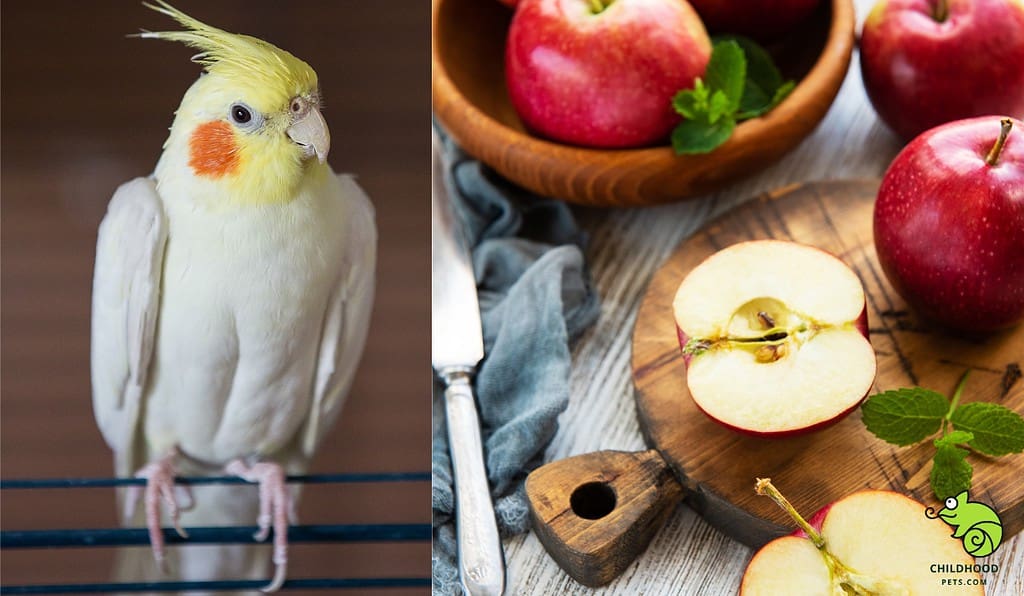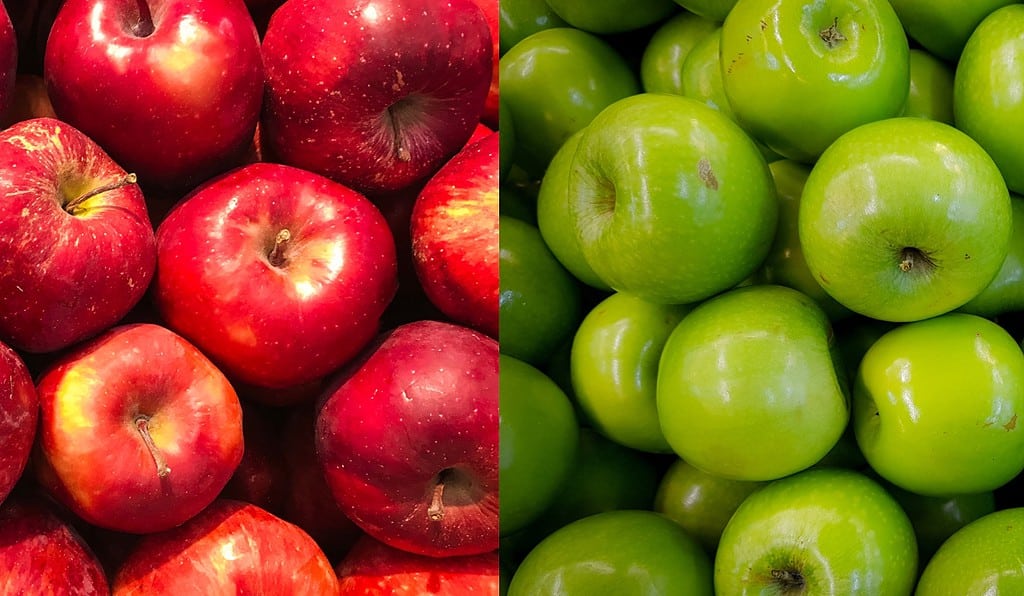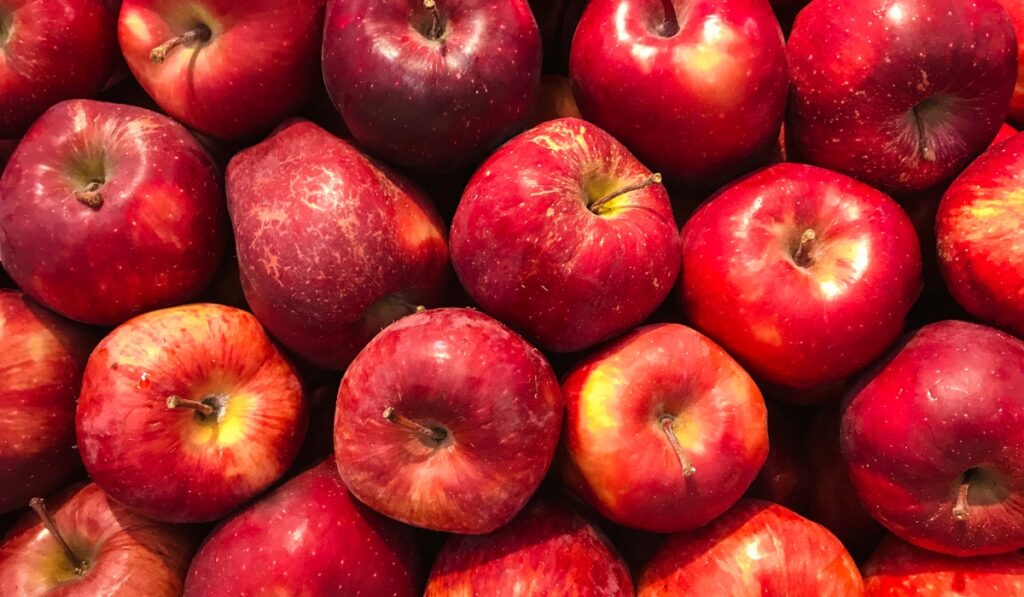
Have you ever caught your cockatiel eyeing your apple with a curious glint? It’s not just their playful nature; these birds are often intrigued by the foods their human companions eat. But the question remains: is it safe for them to nibble on that juicy slice?
As a general rule, cockatiels can eat apples, but it’s essential to ensure they’re seedless and washed to remove any pesticides. Offering them in moderation is key to maintaining their overall health.
Curious about the specifics and how apples can benefit your feathered friend? Dive in as we unravel the mystery behind cockatiels and apples, ensuring you’re equipped with all the knowledge to keep your pet chirpy and healthy!
🍎 Did You Know? Apples are among the top 10 favorite fruits of many birds, not just cockatiels!
The Nutritional Value of Apples for Birds
Apples, as many of us know, are packed with a wealth of nutrients. They’re not just a treat for us humans but can also be a delightful snack for our birds. Apples are rich in calories, carbohydrates, and an array of vitamins that can be beneficial for our winged companions.
| Nutrient | Amount in 100g of Apple |
| Calories | 52 kcal |
| Total Fat | 0.2g |
| Saturated Fat | 0.03g |
| Cholesterol | 0mg |
| Sodium | 1mg |
| Total Carbohydrates | 13.8g |
| Dietary Fiber | 2.4g |
| Sugars | 10.3g |
| Protein | 0.3g |
| Vitamin D | 0IU |
| Calcium | 6mg |
| Iron | 0.12mg |
| Potassium | 107mg |
| Vitamin C | 4.6mg |
| Vitamin A | 54IU |
Are Apples Healthy For Cockatiels?
Absolutely! When given in moderation, apples can be a healthy treat for cockatiels. Here’s why:
- Vitamin C: Boosts their immune system and aids in tissue repair.
- Vitamin A: Essential for maintaining healthy skin, eyes, and feathers.
- Vitamin B6: Helps in metabolism and can be especially beneficial during molting.
- Fiber: Aids in digestion and ensures a healthy gut.
- Potassium: Regulates blood pressure and ensures proper muscle function.
- Magnesium: Vital for bone health and energy production.
Moreover, apples are low in calories, making them a guilt-free treat. And with their high water content, they can also help in keeping your cockatiel hydrated, especially during those hot summer days.
🌞 Tip: On hot days, offering fruits with high water content can be a great way to keep your birds hydrated!
Can Cockatiels Eat Apples?
Now, let’s address the main question. Yes, cockatiels can indeed enjoy apples. In fact, I’ve seen many cockatiels who absolutely adore the sweet and juicy taste of this fruit. But, like everything, there’s a right way to introduce apples into their diet.
- Start Small: Begin by offering a tiny piece and observe how your cockatiel reacts.
- Seedless is the Way: Always ensure you remove all seeds. They contain cyanide, which can be harmful.
- Wash Thoroughly: Make sure the apple is clean and free from pesticides.
- Moderation is Key: While apples are healthy, they shouldn’t replace a balanced diet. Offer them as an occasional treat.
- Monitor Their Reaction: Some birds might have a sensitive stomach. If you notice any adverse reactions, it’s best to consult with a vet.
“Always ensure you remove all seeds from apples before offering them to your cockatiel”
Specific Things to Consider When Feeding Apples
Before you rush off to share an apple with your feathered friend, there are a few more specifics you should be aware of.
Red Apples vs. Green Apples

Both red and green apples can be a treat for cockatiels, but there are some differences to consider:
| Aspect | Red Apples | Green Apples |
| Sweetness | Sweeter | Tart |
| Sugar Content | Higher | Lower |
| Texture | Softer | Crispier |
Apple Juice and Cockatiels
Thinking of offering some apple juice? Here are some things to keep in mind:
- Natural is Best: If you’re giving apple juice, ensure it’s 100% natural without added sugars.
- Limit Quantity: A small amount occasionally is okay. Don’t make it a daily habit.
- Avoid Store-Bought: Many commercial juices have added sugars and preservatives. Always read the label.
Apple Skin and Cockatiels
When it comes to the skin, here’s how you should prepare it:
- Wash Thoroughly: Ensure you remove any pesticide residues.
- Peel if Necessary: If you’re unsure about the cleanliness, it’s best to peel the apple.
- Observe Your Bird: Some cockatiels might not like the skin, while others might enjoy it. It’s all about personal preference.
Apple Seeds: A Danger Zone
Apple seeds are a strict no-no. Here’s why:
- Cyanide Content: Apple seeds contain a compound that can release cyanide when ingested.
- Small Quantities are Harmful: Even a few seeds can be harmful to your cockatiel.
- Other Fruits to Beware of: Just like apples, fruits like cherries, apricots, and peaches have seeds or pits that can be toxic to cockatiels.
Remember, our feathered friends rely on us for their well-being. Let’s ensure we offer them not just love and care, but also a diet that keeps them chirping happily for years to come!
How Much and How Often Should Cockatiels Eat Apples?

Navigating the dietary needs of cockatiels can sometimes feel like walking a tightrope. You want to give them treats, but you also want to ensure they’re getting the right nutrients. So, how often should you treat your cockatiel to an apple slice?
Firstly, it’s essential to understand that while apples are nutritious, they’re also high in sugar. Too much of it can lead to obesity and other health issues in birds. Therefore, moderation is key. I recommend offering apple slices to your cockatiel once or twice a week. This frequency ensures they reap the benefits without overloading on sugar.
| Fruit | Recommended Quantity per Serving | Frequency |
| Apples | 1-2 small slices (seedless) | Once a week |
| Bananas | 1-2 small slices | Once a week |
| Berries (blueberries, strawberries) | 2-3 berries | Twice a week |
| Grapes | 1-2 grapes (seedless) | Once a week |
| Mango | 1 small slice | Once a week |
Preparing Apples for Cockatiels
Now that you’re aware of the quantity and frequency, let’s talk about preparation. Serving apples to your cockatiel requires a bit more than just slicing and dicing.
- Choose Organic: If possible, opt for organic apples. They’re free from harmful pesticides and chemicals.
- Wash Thoroughly: Even if you’re going for organic, always wash the apple under running water to remove any residue or contaminants.
- Remove the Seeds: As previously mentioned, apple seeds contain cyanide, which can be harmful to cockatiels. Always ensure you remove them.
- Slice into Manageable Pieces: Cockatiels are small birds, so ensure the apple slices are appropriately sized for them to handle and eat.
- Monitor Your Bird: The first time you offer an apple, watch your cockatiel. Some might be hesitant, while others might dive right in. It’s also a good way to ensure they’re not having any adverse reactions.
Frequently Asked Questions
What fruits can cockatiels not eat?
Certain fruits like avocados and fruit seeds or pits can be toxic to cockatiels.
What fruits are good for cockatiels?
Cockatiels enjoy a variety of fruits like apples, bananas, berries, and mangoes.
What’s a cockatiel’s favorite food?
Every cockatiel is unique! While many love fruits, they also enjoy seeds, pellets, and veggies.
Can cockatiels eat pineapple?
Yes, in moderation. Just ensure it’s fresh and not canned.
Wrapping Up
Understanding the dietary needs of your cockatiel is a journey, one filled with trial and error. But remember, it’s a journey you’re taking together. As a vet, I’ve seen the joy a well-fed and cared-for cockatiel brings to a household. So, next time you’re munching on an apple, slice up a piece for your feathered friend. And if you found this article helpful, I’d love to hear your experiences in the comments. Don’t forget to share it with fellow bird enthusiasts!
